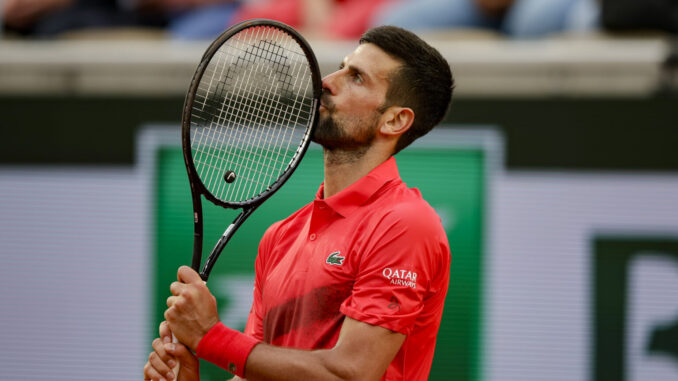
In the midst of Roland Garros 2025, where the red clay courts pulse with the intensity of tennis’s greatest battles, Novak Djokovic, the 24-time Grand Slam champion, opened up about the defeat that still haunts him. As the 38-year-old Serbian star powered into the third round with a 6-3, 6-2, 7-6(1) victory over France’s Corentin Moutet on May 30, his mind drifted to a loss far removed from the Grand Slam stage: his first-round exit to Juan Martin del Potro at the 2016 Rio Olympics. “I had for a year and a half the best results of my life. At that point, I had all four Grand Slam titles in a row,” Djokovic recalled, his voice heavy with the weight of that moment. “That might be the most painful loss,” he added, a rare glimpse into the vulnerability of a player who has dominated tennis for nearly two decades.
The 2016 Rio Olympics marked a pinnacle of Djokovic’s career, as he arrived in Brazil as the world No. 1, holding all four major titles—a feat known as the “Djokovic Slam.” Fresh off victories at the 2015 Wimbledon, US Open, 2016 Australian Open, and French Open, he was the overwhelming favorite to claim the elusive Olympic gold, the one accolade missing from his glittering resume. But del Potro, the towering Argentine fresh from wrist surgeries, played a fearless match, unleashing 41 winners in two tiebreak sets to stun Djokovic 7-6(4), 7-6(2). “I played an okay match, and I don’t want to take anything away from Del Potro, who beat me in the first round,” Djokovic said, gracious in defeat. The loss, which saw del Potro go on to win silver, left Djokovic emotionally drained, his dreams of Olympic glory shattered until he finally claimed gold in Paris 2024, sobbing on the court as he declared, “Nothing can beat that in terms of professional sport.”
Djokovic’s reflection comes at a time when his resilience is under scrutiny. His 2024-25 season has been a rollercoaster, with a historic 100th career title in Geneva but also setbacks like a third-round US Open loss to Alexei Popyrin, where he admitted, “I have played some of the worst tennis I have ever played.” At Roland Garros, he’s battled a blister issue but remains a force, with a 12-0 record against French players in Paris. His third-round win over Moutet, sealed with a commanding tiebreak, sets him up against Austrian qualifier Filip Misolic on May 31, as he chases a record-extending 25th Grand Slam title. The defeat to del Potro, however, lingers as a reminder of his mortality, especially as he navigates the physical toll of age. “I have always played well at the Olympics, but I just could not get past the semi-finals,” he noted, referencing earlier losses to Rafael Nadal in 2008 and Andy Murray in 2012.
The Rio loss resonates because it disrupted a period of unparalleled dominance. Djokovic’s 2015-16 run saw him win 11 titles in 2015 alone, including three majors, and complete his career Grand Slam at Roland Garros 2016. Del Potro’s victory, fueled by his thunderous forehand, halted that momentum, forcing Djokovic to confront failure at a moment when he felt invincible. “I was at the peak of my career in terms of results, sensations and confidence in my game,” he told a YouTube channel, recalling the immense pressure he felt. The defeat sparked a challenging period, with an elbow injury and form struggles in 2017, though he rebounded spectacularly, winning 12 majors since turning 30.
Fans on social media have rallied behind Djokovic, with one post stating, “That Rio loss hurt, but it’s why his Paris gold means so much—Novak’s a fighter.” As he progresses in Paris, where the men’s final is set for June 8, Djokovic’s focus remains on etching new chapters in his legacy. Aryna Sabalenka, a close friend, predicted he could play for “another two, three years,” a sentiment he echoed in Geneva: “The motivation is still there.” The 2016 defeat, while painful, is a testament to his ability to rise above setbacks, a quality that continues to define his quest for greatness on the clay of Roland Garros and beyond.
Leave a Reply